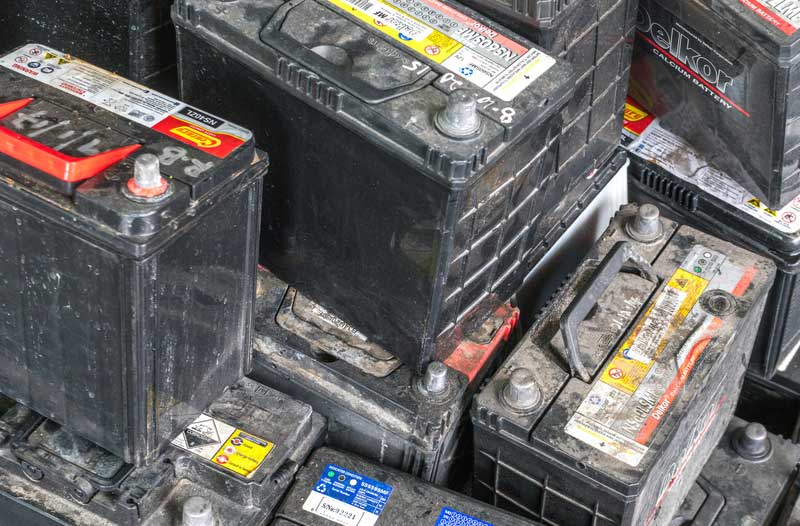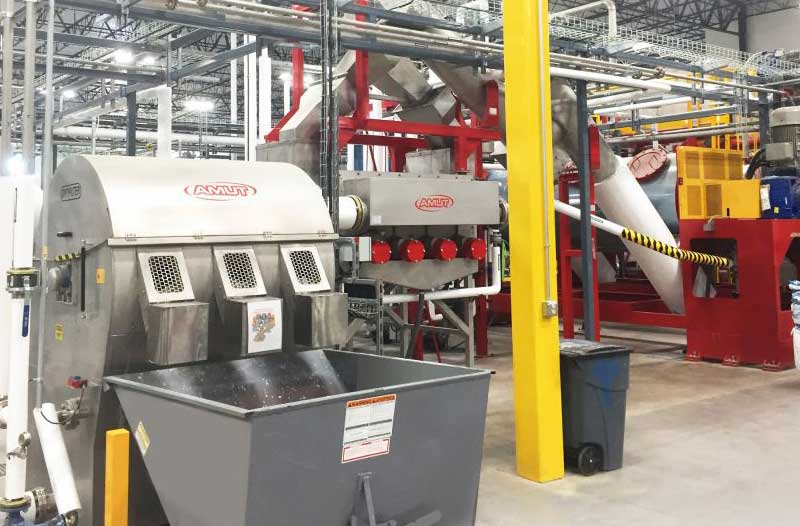- Circular economy: turning waste into reusable material
- Innovative startups and corporate giants are cooperating to improve PET recycling efforts
- Coca-Cola fights plastic pollution
- Retailers curb the use of throwaway plastics
- Increasing efforts to solve our plastic waste problem
Around 300 million tonnes of plastic waste are produced each year, which is roughly equal to the “weight of the entire human population”. A large portion of this usually non-biodegradable waste consists of single-use products such as bottles, food containers, and biscuit trays made from polyethylene terephthalate (PET), a type of plastic derived from ‘dirty’ sources such as crude oil. Most of these plastic products end up in landfills and oceans, contaminating nature and the seafood that humans consume, while only 15 per cent of it reaches recycling plants. And as the scale of environmental pollution becomes increasingly evident, companies are coming up with various ways to address this problem.
For instance, Waitrose, a UK-based supermarket chain, replaced 600,000 plastic straws from its on-site cafes with paper ones. And Co-op, a British retail company, is planning to use recycled plastic for its water-bottling business in a bid to reduce plastic waste by 350 tonnes annually. One of the most promising initiatives, however, is led by Ioniqa, a Dutch startup that found a way to recycle all types of PET waste, including coloured and contaminated items, into a transparent PET plastic that can be used in food and water packaging. This technology has attracted even the attention of giants like Unilever, which plans to use it to reduce its negative environmental impact and contribute to the growth of the circular economy.
The Circular economy: turning waste into reusable material
A Circular economy strives to replace the current make-use-dispose economic model with one in which we extract the maximum value from products and materials, relying on recycling, reusing, and upcycling. If widely adopted, a circular economy could “release $4.5 trillion in new economic potential by 2030” on a global level. And a number of companies have already started to implement this business philosophy and reap the rewards.

Johnson Controls, a global producer of automotive parts, for example, has designed automotive batteries in which “99% of the materials can be reused”. Consumers can return old batteries that are then recycled by melting the lead and recycling plastic, and the recycled material is used in the production of new batteries. A Circular economy is also a great opportunity for startups. The Swedish startup Sellpy, founded in 2014, wants to become the Amazon of used goods by picking up and selling products that people want to get rid of, such as clothes or furniture, and giving them 40 per cent of the profit. The company is essentially extending the useful life of products and preventing people from throwing them in the garbage. Last year, Sellpy reached a turnover of $10,8 million, and backed by the clothing giant H&M, has a promising future.
The public sector is keen to promote the circular economy, too. Earlier this year, China and the EU signed a joint Memorandum of Understanding on Circular Economy Cooperation in an attempt to align policies that “support the transition to a circular economy”. This partnership will, hopefully, have a positive impact on the economy. It could potentially help companies from both blocks to create product standards, share recycling know-how, and improve the existing situation, in which only nine per cent of “the world’s resources are cycled back into the economy after use”. And one of the most pressing challenges for the EU and China in particular, and the circular economy in general, is plastic pollution and the inability to fully recycle and reuse all types of plastics, including PET.
Innovative startups and corporate giants are cooperating to improve PET recycling efforts
The current PET recycling system typically involves shredding plastic waste into small fragments that are then cleaned, processed, and eventually used in a range of products such as clothing and carpets. But there are limitations to this method as, for example, many countries lack the infrastructure necessary to efficiently collect and sort PET waste. But even with proper infrastructure, coloured PET plastic usually can’t be recycled into a material suitable for the production of food-safe packaging, as it contains traces of colour and contaminants that are hard to remove. Ioniqa’s technology, however, might be a solution to this problem.
It relies on a proprietary magnetic smart material that changes its properties when exposed to a stimulus such as a magnetic field. It acts as a catalyst in the process of depolymerisation, breaking down PET from its complex polymer structure into smaller molecules called monomers, absorbing colour and impurities from shredded PET waste in the process. The end result is a liquid that’s dried into a powder form and used to produce food-safe transparent PET plastic.

Meanwhile, Ioniqa has signed an agreement to supply the powder-like material to Indorama, a petrochemical company, which will turn it into PET resin. In the next stage, the resin will be shipped to Unilever that will use it to produce bottles for drinks and beauty products. David Blanchard, the chief research and development officer at Unilever, says that “This innovation is particularly exciting because it could unlock one of the major barriers today – making all forms of recycled PET suitable for food packaging.”
And as Unilever plans to have all of its plastic packaging “reusable, recyclable or compostable by 2025”, Ioniqa also has big plans. This Dutch company is building its first PET-recycling factory that should begin operation in the summer of 2019 and start shipping around 10,000 tons of its new PET powder material each year. That output is small compared to the market demand, but Tonnis Hooghoudt, Ioniqa’s CEO, explains that they’ll eventually scale up the production to 100,000 or 200,000 tons. Also, they’ll license the technology to other businesses to increase the use of this recycling method. As for the future, Hooghoudt notes that the company will work on developing recycling techniques for other types of plastics.
Coca-Cola fights plastic pollution
Much like Unilever, Coca-Cola also has plans to increase the use of recycled plastic in its packaging. In fact, this beverage giant hopes that by 2030, its packaging will be made of at least 50 per cent recycled materials and that it’ll “recycle a bottle or can for every one the company sells”. To achieve these goals, Coca-Cola is financially supporting companies like Ioniqa and plans to supply its bottling factories with 100 per cent recycled PET plastics. In addition to this, it contributed $15 million to Circulate Capital, a venture loan fund that supports companies and infrastructure projects that combat plastic waste in oceans.
But environmental groups like Greenpeace aren’t impressed by these moves as they claim that drink companies such as Coca-Cola, PepsiCo, and Nestle are some of “the world’s biggest producers of plastic trash”. In fact, companies like these produce around 500 billion single-use plastic bottles each year, and as Annie Leonard, the executive director of Greenpeace USA, says, “there is no way that we can recycle our way out of a problem of that scale”. Instead, it’s essential that the production of new plastic products is reduced. Parallel with that, Coca-Cola could use recycled material for the 3,400 bottles it produces each second and stop increasing the amount of plastic waste on the planet. This plan, unfortunately, has a major flaw as currently there’s “nowhere near enough high quality [recycled] food grade plastic available on the scale that was needed” to replace throwaway bottles. That’s why the spread of technologies like the one made by Ioniqa is crucial in increasing our capacity to produce food-grade plastics from recycled materials.
Retailers curb the use of throwaway plastics
In addition to food and drink manufacturers, retailers are also fighting plastic pollution. For instance, Waitrose, a UK supermarket chain, will replace the 600,000 plastic straws it needed every year with paper straws, and it will offer “non-plastic cutlery and drink stirrers made from wood”. Also, the company steadily eliminated non-recyclable materials from its production process, and now, 80 per cent of the packaging in its products is considered recyclable. Co-op, another British retailer, is planning to use recycled plastics in its water bottling business and hopes to remove black and dark-coloured plastics from its aisles by 2020. The reason for this move is that PET waste-sorting machines can’t efficiently detect darker plastics, which then end up in landfills with other unsorted and non-recyclable materials. Lastly, Co-op has even developed a biodegradable paper tea bag to reduce plastic waste caused by UK’s favourite drink.
Increasing efforts to solve our plastic waste problem
Most PET plastics that humans produce ends up in landfills and oceans, polluting the environment and finding its way even to our plates. The scale of environmental disaster is alarming and companies are ramping up their efforts to improve plastics recycling processes. Ioniqa has made serious advances in that regard by inventing tech that makes any PET plastic suited for recycling and ensures that it can be used as food-safe packaging.
But it will take much more to clean up our planet. Manufacturers need to reduce the production of single-use plastics and ensure their supply chain adheres to the principles of the circular economy. ‘Recycle and reuse’ should become a new motto for companies, as we can no longer afford to ignore the plastic waste that’s drowning our planet. Many entrepreneurs and public institutions have already supported the development of the circular economy, which is also a major growth factor for global business.
Share via:


